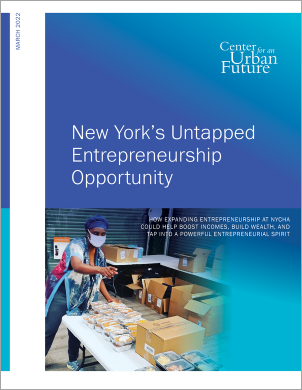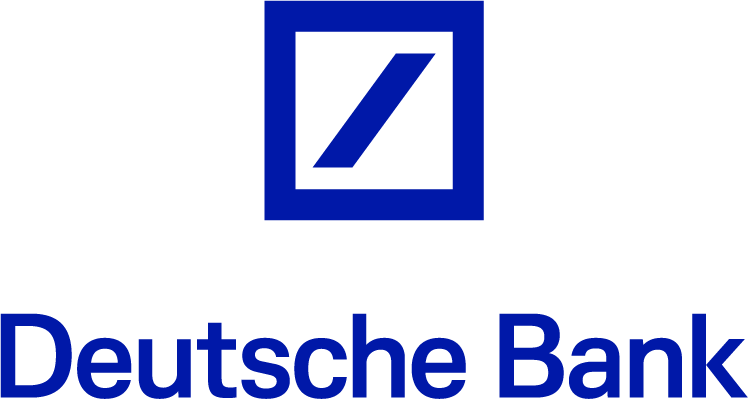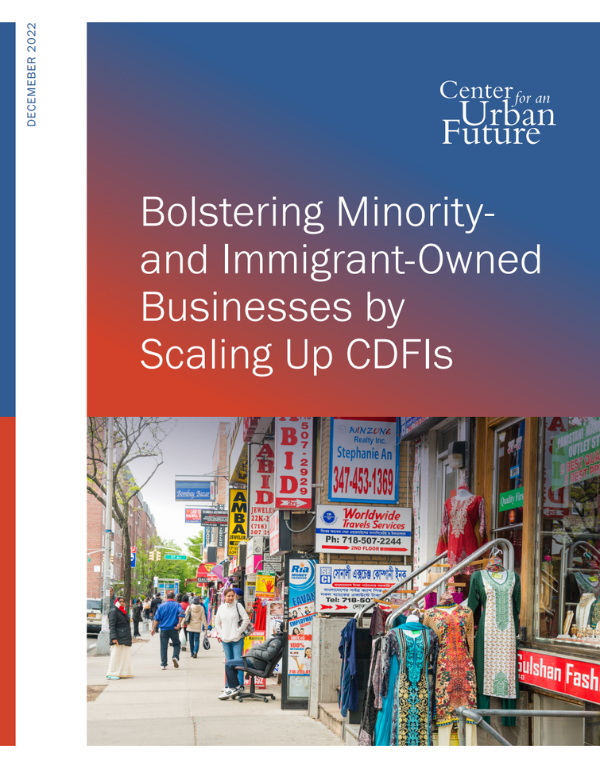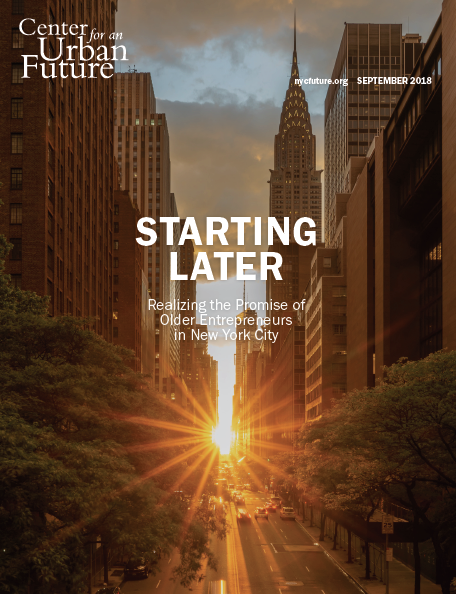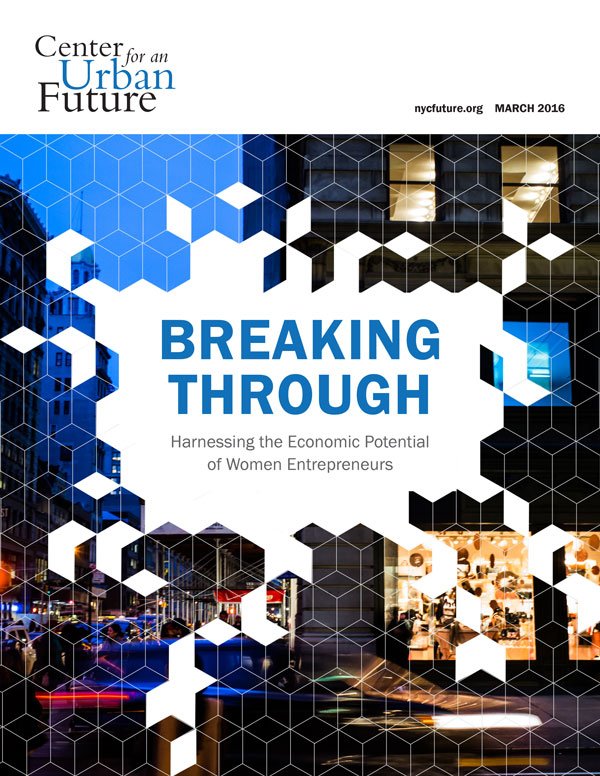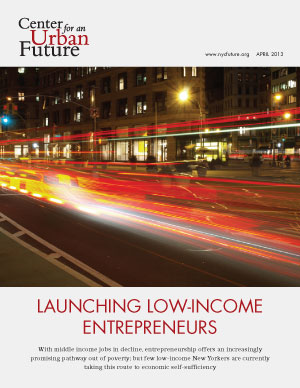15 Ideas for New York City to Help NYCHA Entrepreneurs Launch and Grow
Set a goal of sparking and supporting 2,500 NYCHA entreprenurs over the next five years and back it up with a $10 million investment. Mayor Adams and the City Council will face an urgent need to help more NYCHA residents get on the path to economic self-sufficiency, and greater support for entrepreneurship should be part of that strategy. But to date, little public investment has been aimed at supporting aspiring public housing entrepreneurs. City leaders should set a goal of increasing the number of NYCHA business owners from the current 1,758 to 4,258 by 2025 and invest $10 million in order to achieve it.
Kickstart NYCHA entrepreneurship with a highly publicized startup competition. Entrepreneurship is widespread among NYCHA residents, but the vast majority of resident-run businesses are operating informally and under the radar. The city should encourage and empower NYCHA entrepreneurs to step out and transform their side-hustles into growing, full-fledged enterprises through a marquee startup competition with a significant $25,000 cash prize. Modeled after the Queens Economic Development Corporation (QEDC) StartUp! Competition, the NYCHA Side Hustle to Full-Time Competition would provide classes, mentorship, and network opportunities to all participants over a six-month program centered on workshops and one-on-one advising. The QEDC program would be adapted to meet NYCHA entrepreneurs where they are, helping all workshop participants develop a pitch and business plan and providing additional assistance to all finalist businesses to register their business, become tax compliant, and acquire all relevant permits and licenses. A panel of judges would select four winners, each from four different industry categories popular among NYCHA residents, to receive $25,000 in cash to develop their business. Runners up could receive other valuable awards, such as free storefront space in NYCHA developments for a full year. This significant cash prize would help galvanize interest in formalizing businesses within the NYCHA community and showcase the ingenuity and creativity of NYCHA entrepreneurs.
Tackle structural barriers to saving by greatly expanding enrollment in the Family Self Sufficiency (FSS) program. Among the many barriers to entrepreneurship facing public housing residents, fears that generating income will cause rent to rise to an unsustainable level is an especially pervasive concern. NYCHA’s rent calculation system, as mandated by HUD rules, makes it nearly impossible to build wealth without increasing one’s cost of living, because the cash value of savings and checking accounts are included in the calculation used to determine rent each year. The federal Family Self-Sufficiency (FSS) program provides an important way for public housing residents to save money without increasing their rent, but only 1,274 NYCHA Section 8 residents currently participate in the program. As a housing resident’s income goes up, the FSS funnels their increased share of the rent into an escrow account, where it is held for five years before the resident graduates and receives the funds. Aspiring NYCHA entrepreneurs could then use their savings to start a small business. The Adams administration should invest in boosting NYCHA staff capacity to provide ongoing case management to far more FSS participants. With additional support from the city, NYCHA should launch a major new outreach campaign to enroll 10,000 residents in the FSS program, helping them to save money, preserve their monthly rent, and build up the capital needed to start a successful business.
Launch new business pathsways programs for creative industries. NYCHA’s Office of Resident Economic Empowerment and Sustainability (REES) currently administers two business accelerator programs to help NYCHA residents start and grow businesses: Catering Business Pathways and Childcare Business Pathways. Each program offers participants a free, multi-week intensive business course and assistance with the training, certifications, licenses, and permits needed to run a successful catering business or home-based childcare business. These programs—and the now-discontinued Food Business Pathways—have successfully launched scores of resident businesses. But NYCHA entrepreneurs increasingly are starting businesses in the creative industries. REES should work with the New York City Economic Development Corporation (NYCEDC), nonprofit organizations, and philanthropy to launch new business pathways in growing creative industries, including graphic design, fashion, music, and audio/video production. The REES programs would be tailored specifically to the needs of NYCHA residents, help them access business opportunities in these major NYC industries, and spur interest in entrepreneurship among younger NYCHA residents.
Create a NYCHA business credit fund. NYCHA entrepreneurs often struggle to access the loans and lines of credit they need to grow their business to the next level. NYCEDC should work in partnership with community development financial institutions (CDFIs) and the private sector to enhance access to capital for NYCHA entrepreneurs. Through a credit fund modeled on the Neighborhood Credit Fund but specifically earmarked for NYCHA residents, CDFIs can confidently extend working capital and refinancing opportunities to NYCHA entrepreneurs who have been unable to access business financing from traditional banks, helping them grow their business, expand their footprint, purchase equipment, and create jobs within the community.
Launch community kitchen incubators in all five boroughs. NYCHA entrepreneurs with small but successful food and catering businesses struggle to formalize, bring their businesses out of their apartments, and scale up because of the high cost of renting commercial kitchen space and the low availability of space near their homes. Mayor Adams can help eliminate this roadblock by working with NYCEDC to develop community kitchen incubators in lower-income neighborhoods with significant NYCHA populations. Modeling the new program after the successful Futureworks Makerspace supporting manufacturing entrepreneurship, NYCEDC should work with other local nonprofit partners to provide NYCHA residents and other lower-income entrepreneurs with access to the space, equipment, and education they need to greatly expand their food or catering businesses.
Create new city-supported entrepreneurship training programs designed for NYCHA residents and focused on communities where NYCHA residents live and work. CUF research has shown that relatively few small business assistance organizations are connecting with NYCHA residents, whether through direct outreach to residents or through partnerships with REES, despite operating in communities with significant NYCHA populations. The city should strengthen these connections by providing organizations with a proven track record of success supporting entrepreneurs from traditionally underserved communities with funding to bolster outreach and expand programming tailored to the NYCHA residents. At the same time, NYCEDC can take steps to ensure that more of their supports for entrepreneurs from lower-income and historically disadvantaged communities, like Opportunity M/W/DBE, the Neighborhood Credit Fund, Queens FEASTS, and Futureworks Makerspace reach NYCHA residents. The Adams administration should direct NYCEDC to partner with the Department of Small Business Services and NYCHA to develop a series of programs designed to increase the number of NYCHA entrepreneurs and help active NYCHA entrepreneurs take their existing businesses to the next level. This might include restarting the Queens FEASTS (Food Entrepreneurship and Services Training Space) program operated by the Queens Public Library—which provided training, counseling, vendor opportunities, and assistance obtaining licenses and permits for entrepreneurs looking to start or grow a food or restaurant business—and expanding that model through partnerships with the other two library systems.
Provide microgrants to boost NYCHA business formation, cover unforseen expenses, and expand participationin in fairs, markets and other marketing opportunities. NYCHA resident entrepreneurs rarely have access to the friends and family funding or personal wealth that’s crucial to making it through the first stages of starting and growing a business. The city should work with private funders to provide microgrants of even just $1,000 to NYCHA resident entrepreneurs. These grants would allow resident entrepreneurs to cover the routine expenses of registering a business and applying for licenses or deal with unforeseen expenses that might otherwise force them to abandon their enterprise. Small grants could also help NYCHA entrepreneurs market their products and get opportunities to connect with customers, including through digital marketing and participation in food fairs, flea markets, and bazaars, which often require upfront payment for kiosk space and insurance.
Provide no-collateral loans to NYCHA resident entrepreneurs. Nearly all small business loans from traditional banks and CDFIs alike require collateral, yet few NYCHA entrepreneurs have significant equity or assets to provide as collateral—in large part because of how NYCHA’s rent calculation system disincentivizes residents from accumulating non-personal items with cash value. The city should work with microfinance organizations and other mission-driven financial institutions to expand no-collateral small business loans to NYCHA resident entrepreneurs. In place of collateral, applicants would participate in a technical assistance program to develop a business plan and financial statements to mitigate risk for the lender and the city would provide a loan-loss reserve to further hedge against risk.
Leverage vacant commercial spaces for NYCHA entrepreneurs to expand beyond their homes. Alongside its residential properties, NYCHA manages over 2.5 million square feet of commercial, retail, and community spaces. But at any given time, dozens of these spaces are sitting vacant, in part due to unmet repair needs. Mayor Adams should rally business and philanthropy to invest in rehabbing NYCHA’s commercial and retail properties to activate the housing authority’s vacant street-level spaces and make them available to local NYCHA resident entrepreneurs as pop-up retail spaces for food, clothing, personal care services, and other businesses. REES could also work with NYCHA’s real estate division to set up shared commercial spaces for residents who have outgrown their apartments but cannot yet afford a market-rate office or production space.
Reform NYCHA contracting to expand opportunities for resident entrepreneurs. NYCHA should make it easier for resident-owned businesses to participate in NYCHA’s procurement opportunities and bid on service and vending contracts by de-bundling larger contracts. Large contracts end up favoring bigger, established firms. Breaking up contracts for services would allow smaller, resident-owned and -operated firms better access to doing business with NYCHA because more would have the capacity to qualify for RFPs. But the city should go further to develop new mechanisms that can give NYCHA resident-run businesses increased priority and access. The Adams administration should direct NYCHA to explore procurement methods that exclusively solicit resident businesses for services such as catering, carpentry, IT, and environmental testing. The mayor also should explore marrying federal and state grants for training with NYCHA contract requirements, so that more NYCHA entrepreneurs have the skills and expertise needed to qualify for contracts. Reforming the bid process and aligning training programs with housing authority needs would expand opportunities for NYCHA resident entrepreneurs to contract with NYCHA and grow their business within the public housing ecosystem.
Create kiosks and pop-up opportunities for NYCHA entrepreneurs on city-owned property. In 2018, The Brooklyn Navy Yard and NYCHA’s Food Business Pathways created a highly successful food kiosk program that enabled NYCHA food business entrepreneurs to sell their products in Building 77 alongside Russ and Daughters and other classic NYC businesses. The rotating program earned NYCHA entrepreneurs thousands of dollars in revenue and provided valuable hand-on-experience in a bustling commercial setting. The kiosk model should be expanded across the city to other high-traffic, city-owned or -leased spaces, including parks and plazas. The Mayor’s Office should help NYCHA work with the Department of Health and other agencies to proactively address regulatory issues like those which forced the Navy Yard kiosk to close prematurely.
Invest in the creation of NYCHA worker cooperatives. The worker cooperative model has the potential to give NYCHA residents overcome the barriers to entrepreneurship and build wealth within the community by co-owning a business as worker-owners. The city should expand the Worker Cooperative Business Development Initiative to specifically target public housing residents. Community-based service providers contracted with SBS could help NYCHA residents incorporate their cooperatives and structure the business to protect residents from rent-increase concerns that often disincentive residents from formalizing their businesses. The worker cooperative model provides financial stability, workplace democracy, and a structure that encourages job training and wealth creation within the community. Community-based organizations like Urban Upbound have helped launch successful NYCHA resident-owned worker cooperates that have hired and trained hundreds of worker-owners. The city should build on this success and invest an additional $1 million annually to support the development of existing and new NYCHA worker cooperative businesses.
Fund workforce training organizations to expand support for entrepreneurial education. For some NYCHA residents, the best opportunity to boost economic mobility may be training for employment in a high-growth industry. But training participants and providers alike say that many program participants are also seeking support to start a business—both as a means of building wealth and as a way of earning income to support themselves and their families while they pursue job training. The problem is that very few workforce development organizations are funded to provide entrepreneurial education—and tight restrictions on federal workforce dollars mean that city support will be needed to change this. Mayor Adams and the City Council should work together to pilot a new Workforce Entrepreneurship Initiative: a challenge grant for workforce organizations to develop and implement entrepreneurship training and assistance.
Do away with New York's archaic LLC publication requirement. New York is one of only three states that still require newly formed Limited Liability Companies (LLC) to publish an announcement of their formation in the newspaper. Today the requirement can cost upward of $2,000—out of reach for many NYCHA entrepreneurs—and creates an unnecessary burden. The LLC publication requirement is uniquely harmful to low-income entrepreneurs, and it is time for the State Legislature to eliminate this requirement.

